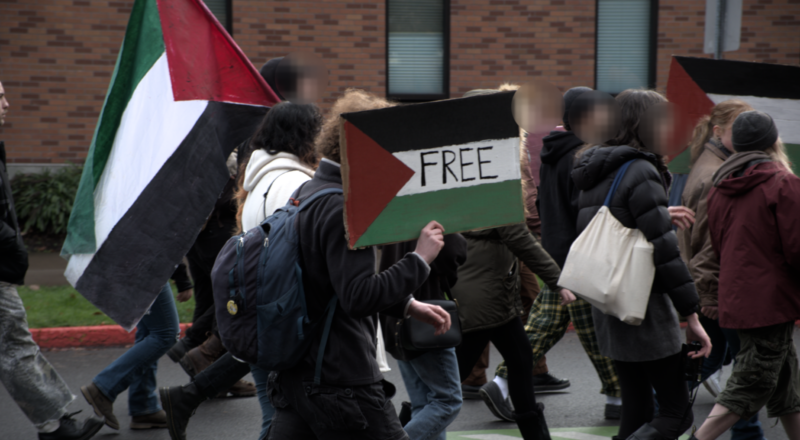On Saturday, January 20, less than a week out from when Eugene faced an ice storm and many were still without power, around 200 people showed up at the Federal courthouse in support of Palestininan liberation. The march, organized by Students for Justice in Palestine at the University of Oregon (SJP UO), traversed across downtown and through the university campus. Protestors led chants and held signs calling for a ceasefire and demanding the US stop its funding of Israel.
“Not a single word could accurately encompass my feelings concerning the atrocities committed against my people. I mourn them. I grieve for them. I think of them in each and every moment of every day. But we must stay strong. Fight for them. Speak out for them. Be their voice,” SJP UO organizer Salem Khoury said from in front of the courthouse.
Just a day after the rally, the Gaza Ministry of Health reported that over 25k people have been killed by Israel since Oct 7. Residents of Eugene have spoken out against the Israeli led genocide at rallies, City Council meetings, and in calls to their representatives. Currently Sen. Merkley is the only member of the city’s federal delegation to call for a ceasefire.
Several new groups have formed in the last few months to advocate for Palestinians. In addition to SJP, these groups include Eugene Jews for a Free Palestine, Committee of Graduate Students for Palestine, Healthcare Workers for Palestine Eugene, and Free Palestine Eugene. Established groups have also formed coalitions, like the Springfield-Eugene Anti-Imperialist Coalition, which turned out a self-reported 130 people in snowy conditions to another rally at the Federal Courthouse a week before.
After a few short speeches at the courthouse, protesters hit the streets of downtown, heading towards campus. The group passed by the office of Rep. Val Hoyle, organizers called it out, and the rest of the protestors sent out boos towards the office’s direction. On the march toward the University of Oregon there was hardly any disruptions. In fact many people stepped outside of businesses as the march passed by to cheer them on.
The group of protestors arrived at the EMU, but instead of stopping and holding a rally outside the amphitheater, everyone headed straight through the doors into the building to take up space on the ground floor of the building. In a show of force in numbers, the group surrounded the entire O Desk, circling it multiple times while chanting. Organizers paused the group to take the stadium stairs and lead an energized rally.
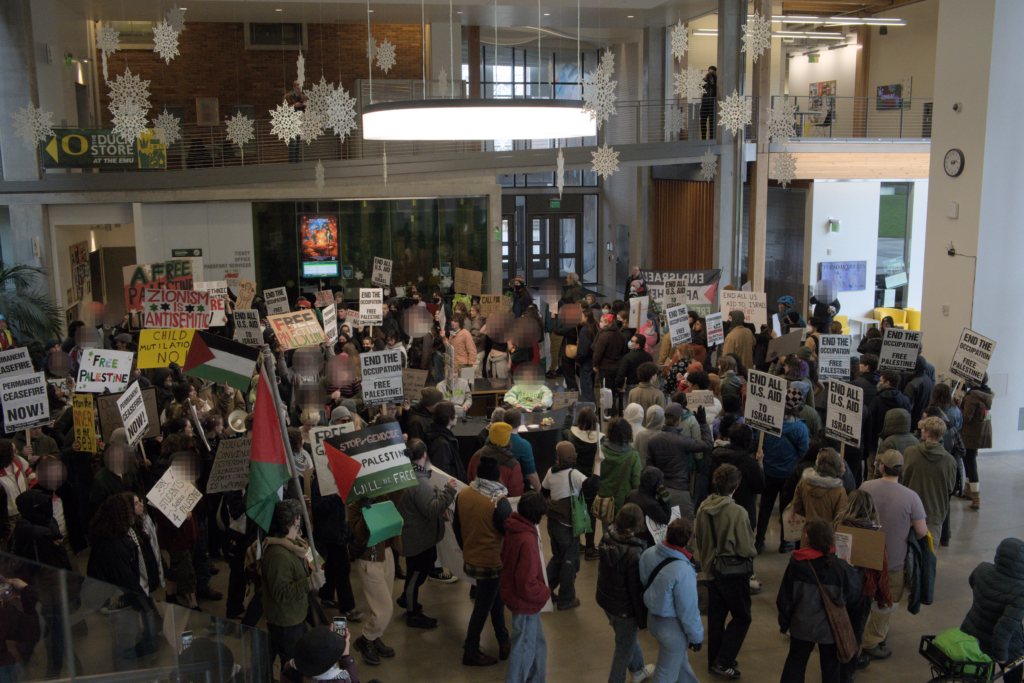
“What we can amass on this campus cannot on its own change the world. But out of a position of privilege in the imperial core at the top of the global hierarchy of fictitious states, means if we change America, we change the world,” Eric Howanietz, who spent formative years living in Palestine, said to cheers.
Howanietz closed the speech with a call to action to pressure the UO Board of Trusteees (BoT) to pass a Boycott Divestment Sanctions resolution, something UO community members introduced to BoT at their last meeting. The next meeting of the board takes place March 11-12, the week before finals for students.
Protestors carried on through campus, going by the dorms, shouting to onlookers encouraging them to come join them down in the march. When the group tried to lead onto Franklin Blvd, they were met by a wall of police. While the police had been trailing them the whole time, this was the first time they had stopped the march. Protestors paused at the intersection of Villard and Franklin, right next to Matthew Knight Arena briefly, before Howanietz who in addition to being a speaker had acted as a leader of the bike security crew for the march, announced to the group that at the moment they did not have the power to bypass the cops and would instead turn around and march back through campus.
As the group exited campus at Kincaid and 13th, cops got more eager to take action against the protestors. Cops parked themselves out right behind the bend of Lilis Business Complex. As Franz Miller, a member of the the bike secrew, turned around the corner his bike got tangled up with a police officer’s bike. The police went on to grab his bike away and slam him up against the hood of one of their cars and arrest him. He was charged with obstruction of the police, but the city later dropped that charge. The City of Eugene is still charging him with disorderly conduct.
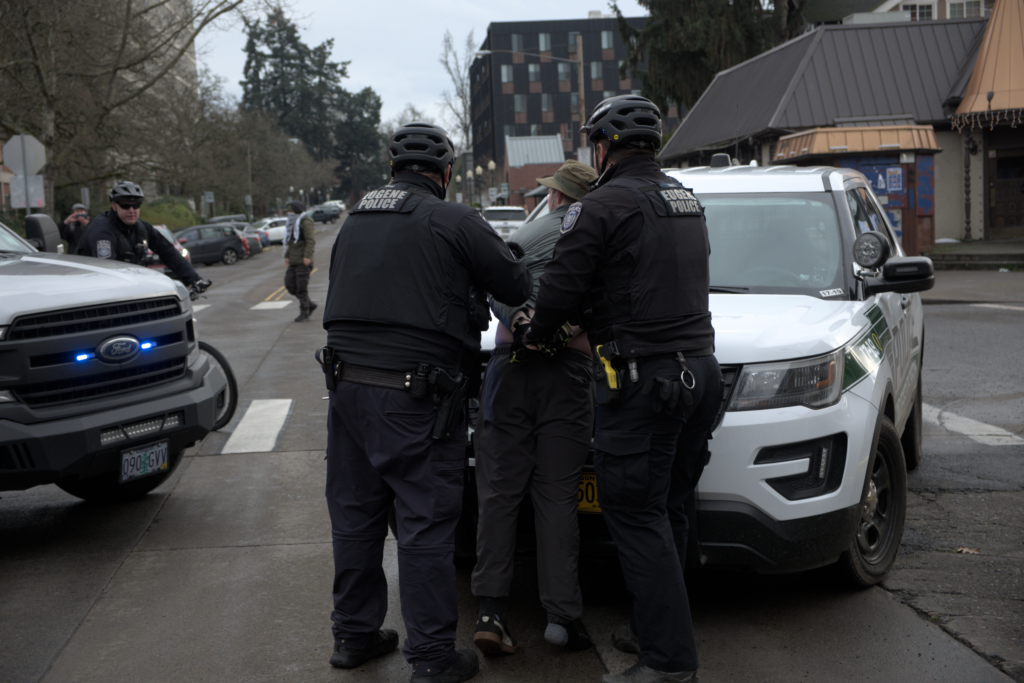
Protestors continued onto Hilyard, when they took a turn on 11th street back toward the federal courthouse they were met with a police baricade once again. Cops announced over their speaker that they were blocking cars and needed to get onto the sidewalk. Folks started getting on the sidewalk along Hilyard and Howanietz announced to the rest of the group that remained that they should follow on in reversing onto the sidewalk on Hilyard. Once Howanietz turned his back on the police, they violently rushed him, threw him off his bicyle and slammed his head to the ground. They arrested him on disordely conduct and ressisting arrest. Following the arrest the police put out a press release falsely claiming that Howanietz told the marchers to push through the police line to justify the actions that they took on Saturday.
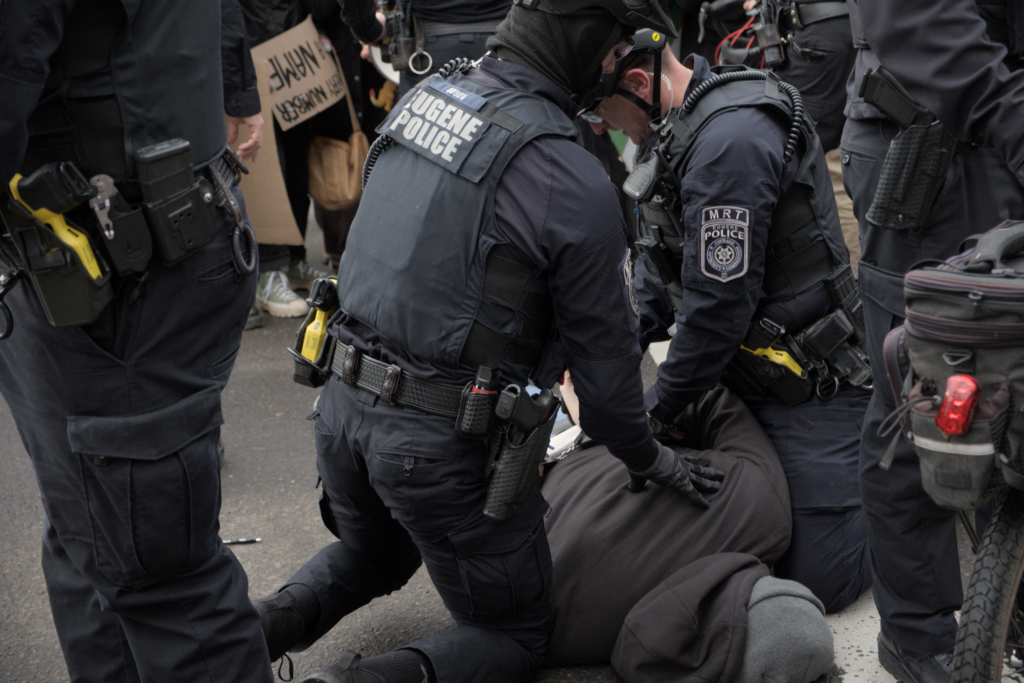
“Now they’ve decided to use the same tired playbook of the 60s and 70s, going after vocal speakers and organizers,” said Howanietz. “They think going after leaders will hobble movements, but they are only going to give voices for Palestinian liberation more credibility.”
Organizers say they meticolously planned a safe route before the march and that the police redirections put the group at a greater risk.
The group continued the march mostly on the sidewalk, but were able to reclaim the road when they got to Broadway. They concluded the march with some speeches at Kesey Square.
Miller and Howanietz, both represented by Civil Liberties Defense Center (CLDC), plead not guilty on Jan 23. They will face trial Feb 20th 12:45pm at the Eugene Municipal Courthouse.
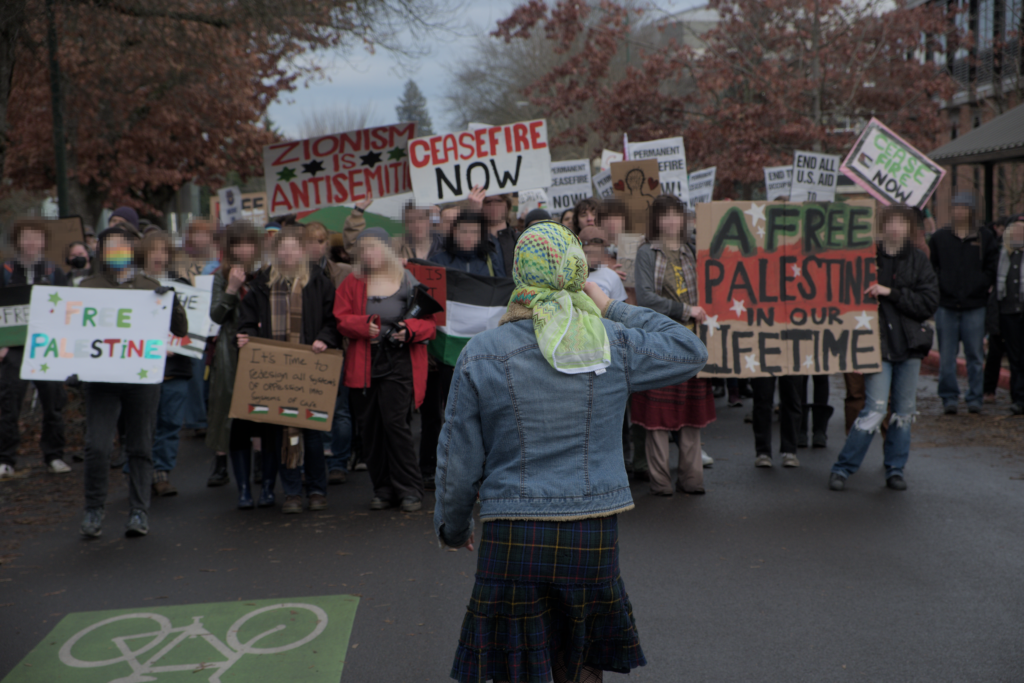
Discover more from Solidarity News
Subscribe to get the latest posts sent to your email.
